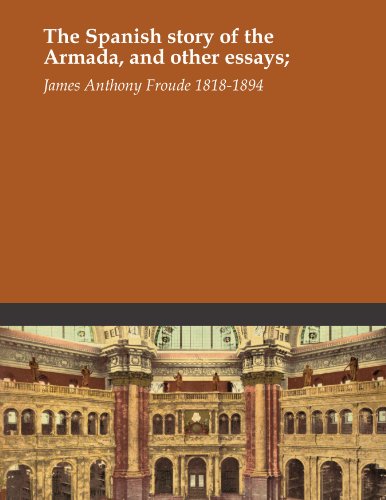Background
James Froude was born on April 23, 1818 in Dartington, Devon, United Kingdom. He was the son of Robert Hurrell Froude, archdeacon of Totnes, and his wife Margaret Spedding (died in 1821). He was the youngest of eight children.



(This book was created at the Library of Congress as part ...)
This book was created at the Library of Congress as part of an extensive scanning effort started with a generous donation from the Alfred P. Sloan Foundation.
http://www.amazon.com/gp/product/B003U6ZXNU/?tag=2022091-20
1892
James Froude was born on April 23, 1818 in Dartington, Devon, United Kingdom. He was the son of Robert Hurrell Froude, archdeacon of Totnes, and his wife Margaret Spedding (died in 1821). He was the youngest of eight children.
James was educated at Westminster and Oriel college in Oxford, United Kingdom and was elected a fellow of Exeter College in Oxford, United Kingdom in 1842.
James joined the High Church movement at Oxford and helped John Henry Newman with his Lives of the English Saints. He became disillusioned with the High Church party after 1845, and, influenced by the ideas of Thomas Carlyle, his religious views shifted toward Protestantism. He resigned his fellowship in 1849.
The first two volumes of Froude's History of England from the Fall of Wolsey to the Death of the Spanish Armada appeared in 1856, with the remaining 10 volumes completed by 1870. In this work, which altered the whole direction of Tudor studies, Froude condemned the scientific treatment of history, for he saw history as a great drama with emphasis upon personalities.
In The English in Ireland in the 18th Century (1872 - 1874) Froude continued to show his admiration for strong rulers and strong government. This work was anti-clerical and anti-Irish. He played down English atrocities and attempted to show that English efforts to conciliate the Irish had been futile.
His admiration for heroic figures was also shown in his work glorifying imperialism, Life of Caesar (1879), and in his further defense of Henry VIII, Catherine of Aragon (1891). At his best Froude presented impressive and powerful accounts of history, laying before the reader a picture of the past magnificently conceived and painted.
His descriptive style was most notable in his shorter essays, Short Studies on Great Subjects (1867 - 1882). However, his inaccurate use of documents brought ridicule from other historians, notably Edward Freeman. Froude's later work was devoted chiefly to a biography of Thomas Carlyle (4 vols. , 1882 - 1884) and a collection of Carlyle's papers (2 vols. , 1881). Froude returned to Oxford in 1892 as regius professor of modern history.
His works are characterized by vivid descriptions and an orderly narrative style. His most famous work is a History of England from the Fall of Wolsey to the Defeat of the Spanish Armada. His most controversial work is a Life of Carlyle, it illuminated his wife's personality and the couple's marital problems.
(This book was created at the Library of Congress as part ...)
1892(Abridged and Edited by John Glubbe.)
1979Nevertheless, Froude was ordained deacon in 1845, initially intending to help reform the church from within. However, he soon found his situation untenable, although he never lost his faith in God or Christianity, he could no longer submit to the doctrines of the Church. He began publicly airing his religious doubts through his semi-autobiographical works Shadows of the Clouds, published in 1847 under the pseudonym "Zeta", and The Nemesis of Faith, published under his own name in 1849.
Froude argued that Ireland's troubles were the result of too little English control and that an even greater English presence is an "enlightened despotism", it was needed to alleviate problems that were inherent to Ireland.
Unlike his historical predecessors, he portrays Henry VIII as a hero of considerable historical importance and Elizabeth I as a weak and uncertain ruler. The Reformation he saw as a struggle of the forces of liberty against the forces of darkness, as represented by the Roman Catholic Church. He viewed the Anglo-Catholic revival of the 19th century as a later clash between the same forces.
Froude was married twice: firstly in 1849 to Charlotte Maria Grenfell (died in 1860); secondly in 1861 to Henrietta Elizabeth Wade (died in 1874). He was survived by one daughter: Margaret of his first wife Charlotte Maria, née Grenfell, and by a son: Ashley Anthony Froude and a daughter: May of his second wife Henrietta Elizabeth, née Warre.
